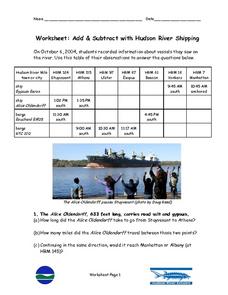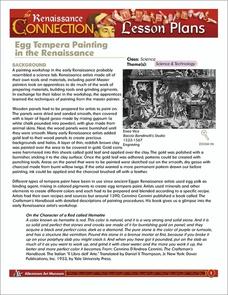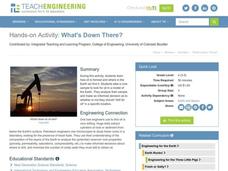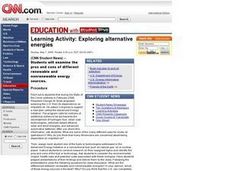Curated OER
Oil Spill!
Students examine how oil spills are cleaned through an interactive program. They review the facts of oil spills and how the oil spreads. They discuss the short and long term effects of a spill and how they can be avoided.
Curated OER
The Will to Drill?
Students read a New York Times article about plans for oil drilling in the Arctic. They examine and debate both sides of the plan to explore for oil in the Arctic National Wildlife Refuge.
Curated OER
The Powers That Be
Students investigate past energy legislation, then write letters to Congress from the perspective of citizens trying to influence the original passage of these bills. Each small group does their research using a website imbedded in this...
Curated OER
British oil dispute with Argentina deepens
Ninth graders discuss the conflict about oil between Britain and Argentina. In this Political conflict lesson plan, 9th graders read an article and answer guided reading questions. Students write an email to their teacher about Black...
Curated OER
Volcanoes
Young scholars make a volcano out of a soda bottle, flower, salt, oil, and more. In this volcanoes lesson plan, students also read about volcanoes.
Curated OER
Oil Slick Emergency
Students examine how to recover and remove oil from an oil spill. In this oil spill clean-up lesson students use role play and act like a committee to determine how to clean up an oil spill.
Curated OER
Add & Subtract with Hudson River Shipping
In this shipping on the Hudson River worksheet, middle schoolers record information about types of vessels seen on the Hudson River and respond to the questions that follow about each. Then they identify the Alice Oldendorff which...
Curated OER
Petroleum Word Search
In this science learning exercise, students find the words related to the product of petroleum and the answers are found by clicking the button at the bottom of the page.
Curated OER
Egg Tempera Painting In The Renaissance
Students explore the development of paint and paintings during the Renaissance. In a science lab, they reproduce the properties of egg in tempera paint and compare and contrast egg tempera paintings to oil paintings. Through...
Curated OER
Oil and Gas As A Source of Energy
Learners discuss the reasons why oil and gas are the United States' main source of energy. In groups, they use the internet to research how the resources are formed and the amount of consumption by the United States. They choose books...
Curated OER
Why Oil and Water Don't Mix
Second graders explore why oil and water do not mix. They make and record their predictions and observe the experiment in which cooking oil is mixed with a glass of water. Students discuss why they think the oil and water did not mix and...
Curated OER
Activity #9 Extending Oil Well Production
Students simulate methods used to extend the effective life of an oil well by extracting less available oil. They identify techniques which can be used and evaluate their effectiveness. Pupils are introduced to rock size and temperature...
Curated OER
Market Game in Oil
Learners work together to participate in a market game in oil. Using their prior knowledge, they review how the interaction of buyers and sellers sets the price in markets. They identify the situations in which cause shortages and...
Curated OER
Oil Spill
Fourth graders watch a video about the types of products made from oil or oil used as energy to produce the product. In groups, they identify the positive and negative aspects of oil and participate in various activities. They use the...
Curated OER
Virtual Oil Well Game
Students play an online strategy game working with a limited budget. They collect and interpret seismic data to search for oil traps, file environmental impact statements before drilling and use drill logs to determine when to start...
Curated OER
Oil Spill
Students use one of four absorbent products to separate as much of the oil and water mixture they are able to do. The purpose of this task is for students to collect and analyze data for the purpose of determining which absorbent is...
Curated OER
What's down there?
students analyze how oil is formed and where in the Earth we find it. Students take a core sample to look for oil in a model of the Earth. They analyze their sample and make an informed decision as to whether or not they should "drill...
Curated OER
Harvesting Oil from the Earth
Fourth graders research sources of fossil fuels especially oil while determining how scientists take core samples from an Earth model. They look at oil consumption and production in the US and throughout the world.
Curated OER
Exploring Alternative Energies
Young scholars research various forms of alternative energy sources and examine the pros and cons of each type. They discuss American oil dependence and the Bush administration's policies regarding this issue.
Curated OER
Oil Trap Model
Students investigate oil accumulation by creating a model in their classroom. For this petroleum geology lesson, students discuss where oil comes from and why it is vital to our society at this particular time. Students cut out a 3-D...
Curated OER
Rosa Parks Community Garden
Ninth graders investigate how we depend on plants as the original source of most food. They investigate the parts of plants, and which parts are edible. Students are explained that the garden is also a classroom and the same rules apply.
Curated OER
Coal and Oil: Powering Our Way of Life
Students identify and represent some common products that are made using petrochemicals and some of the effects that higher gasoline and coal prices would have on the American economy in a graphical format. They synthesize information...
Curated OER
The Oily "Grail"
Students discover the quest for a balance between oil exploration and a concern for the environment in Alaska. They synthesize their knowledge by debating the current length of the oil-drilling season.
Curated OER
Yesterday, Today and Tomorrow -- Oil Recovery Investigation
Learners use a model to show primary and secondary oil recovery processes. They discover the effect of rock porosity and permeability on the recovery process. They discuss how to dipose of waste during the process.

























